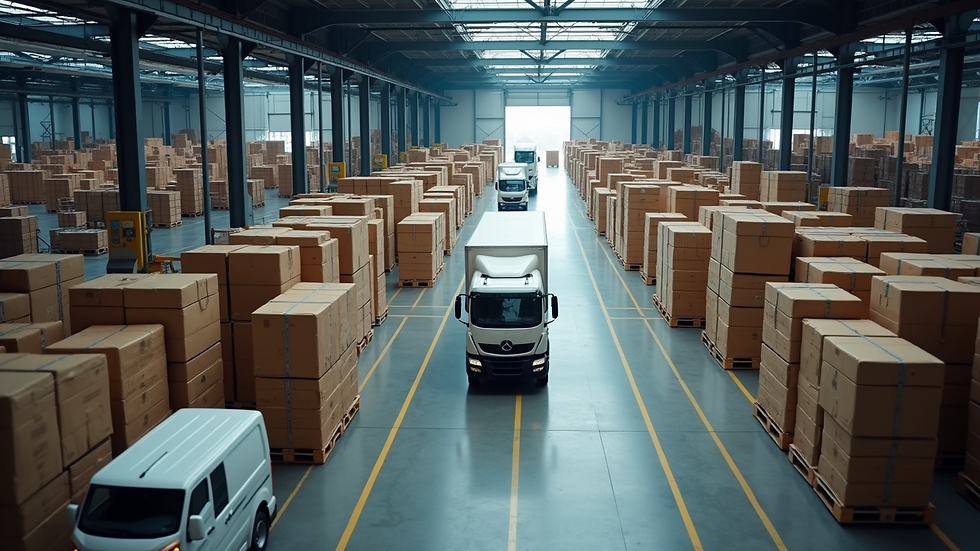Benefits of Commercial Vehicle Insurance for Businesses
- AMITABH GUHA
.jpg/v1/fill/w_320,h_320/file.jpg)
- Jul 28, 2025
- 4 min read
In the bustling world of business, especially for companies that rely on vehicles for their operations, having the right insurance coverage can be vital. Commercial vehicle insurance provides protection not just for the vehicles themselves, but also for the business and its employees. It ensures that if something goes wrong, your company can recover and continue to run smoothly.
Understanding Business Auto Insurance Coverage
Business auto insurance coverage is designed to protect vehicles used for business purposes. This could include trucks, vans, or even cars that are owned or leased by a business. Whether you are delivering goods, transporting clients, or managing a fleet, this type of insurance covers damages and liabilities that may arise during the operation of these vehicles.
Coverage Options for Businesses
When considering business auto insurance, it's important to understand the different types of coverage available. Here are some common options:
Liability Coverage: This is a must-have, as it covers injuries and damages that the insured vehicle may cause to others in an accident.
Collision Coverage: This protects against damage to your own vehicle resulting from a collision, regardless of fault.
Comprehensive Coverage: This type of insurance pays for damages to your vehicle caused by events other than collisions, such as theft, vandalism, or natural disasters.
Uninsured/Underinsured Motorist Coverage: If you're in an accident with someone who doesn't have insurance, or whose insurance isn't adequate, this coverage can help cover your expenses.
Additional Protection Benefits
Protects Your Business Assets: Vehicles are significant investments. Protecting these assets with commercial vehicle insurance shields your company from financial losses due to unexpected events.

Delivery truck ready for business Employee Safety: Businesses depend on their employees to operate vehicles. Insurance provides safety and peace of mind to drivers by offering coverage in case of accidents.
Legal Requirements: Depending on where your business is located, having commercial vehicle insurance may be a legal requirement. Failing to comply can lead to penalties or fines.
Claims Handling: Having a commercial vehicle insurance policy often means that your business has access to a dedicated insurance agent or claims handler who can manage any issues more efficiently than self-insurance options.
Financial Implications of Not Having Coverage
Failing to invest in proper business auto insurance can be a costly mistake for any business. The financial burden that can arise from accidents cannot be overlooked. For instance, according to the National Highway Traffic Safety Administration, motor vehicle crashes cost society more than $800 billion annually. This figure includes lost productivity, medical expenses, and legal costs. Without adequate insurance, your business could be responsible for covering all these expenses out of pocket.
Real-Life Example
Consider a delivery company that does not have commercial vehicle insurance and faces a serious accident while on a delivery run. The company's vehicle is severely damaged, and there are injuries involved. The costs in repairs, medical claims, and legal fees could easily reach tens of thousands of dollars. With insurance, many of these costs would be covered, allowing the business to focus on growth rather than financial recovery.

Customizing Your Insurance Plan
Another significant benefit of commercial vehicle insurance is its ability to be tailored to your business's specific needs. Insurers often offer flexible plans that can be scaled depending on the number of vehicles and the type of coverage required. For businesses with larger fleets, group policies can be more economical than individual coverages.
Factors to Consider While Choosing Coverage
When customizing your plan, consider the following factors:
Vehicle Types: Different vehicles may have different insurance needs. Larger trucks or specialized vehicles may require higher coverage limits.
Usage: Understanding how your vehicles are used can help in determining the level of risk and types of coverage needed.
Geographic Area: The area in which you operate your vehicles can affect insurance rates due to varying risks.
The Importance of Regular Reviews
Finally, it is crucial for business owners to conduct regular reviews of their commercial vehicle insurance policies. This ensures that as your business grows and evolves, your coverage reflects those changes. A policy that was adequate a year ago may not be sufficient for your current fleet or operations.
Tips for Policy Reviews
Evaluate Growth: If your business has expanded or you’ve added new vehicles, it might be time to update your coverage.
Follow Industry Changes: Insurance regulations and requirements can change; staying informed will help ensure compliance.
Assess driving history: Reviewing the driving records of employees can influence your insurance rates and coverage needs.

Going Beyond Basic Coverage
Investing in business auto insurance coverage isn't just about meeting legal requirements; it's about protecting your business from potential financial devastation. The peace of mind that comes from knowing you are covered can enhance your company's operational efficiency and employee performance. Additionally, having the right policy in place may help in attracting clients and facilitating contracts that require proof of insurance.
In conclusion, businesses that depend on vehicles must take serious consideration of their insurance options. A solid understanding of commercial vehicle insurance goes a long way in safeguarding your business from potential pitfalls on the road. If you haven't reviewed your policy recently, now is the time to do so!
For more insights into commercial vehicle insurance options, you can check out this useful resource.
.png)

Comments